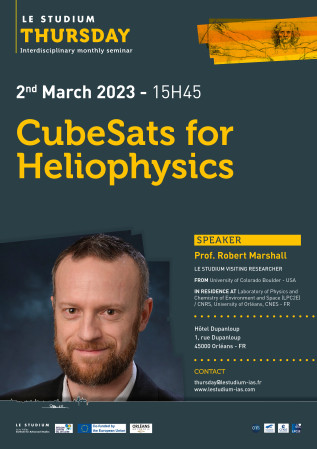CubeSats for Heliophysics
LE STUDIUM
1 Rue Dupanloup
45000 Orléans
France
Presentation
The study of the sun and its impact on the near-Earth space environment, often referred to as heliophysics, has important implications for space- and ground-based technology upon which humanity is increasingly reliant. Understanding and, eventually, predicting space weather events remains the ultimate goal of this field. The space environment is a complex mix of plasma, electric and magnetic fields, and electromagnetic radiation; observing and understanding the complete system requires an ever-evolving fleet of space missions and ground-based observations. Traditionally, large spacecraft missions have been used to target key outstanding science questions; but these missions can take many years to develop, and their cost limits the number of missions that can be launched. Today, a new class of very small missions has reached a level of maturity where they can produce unique science results. These "CubeSats" enable unique missions that can be developed faster and cheaper, but can still make targeted science observations. However, a CubeSat is still a complete spacecraft, requiring all of the same subsystems to operate autonomously; large teams with complementary expertise are still needed. This talk will introduce the field of heliophysics, discuss large and small spacecraft mission design, and look towards the future of small and large satellite missions.
Speaker
LE STUDIUM Visiting Researcher
FROM: University of Colorado Boulder - USA
IN RESIDENCE AT: Laboratory of Physics and Chemistry of Environment and Space (LPC2E) / CNRS, University of Orléans, CNES - FR

